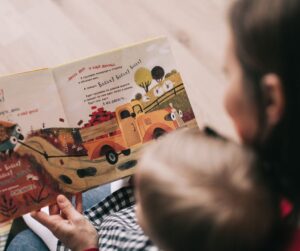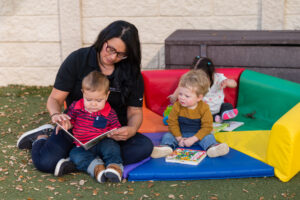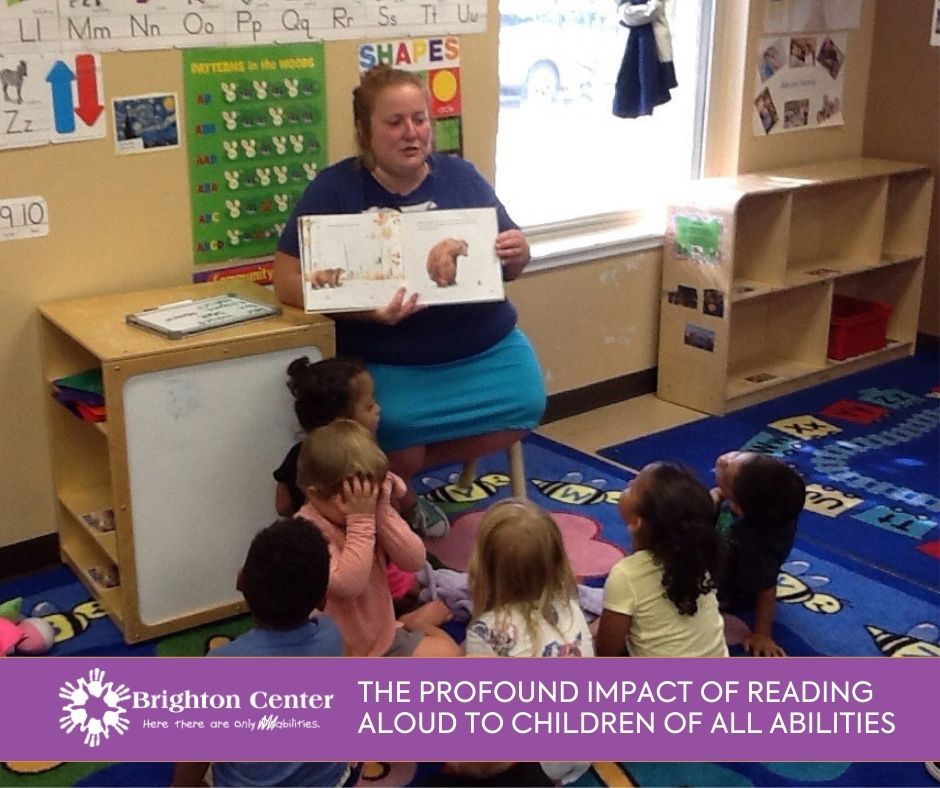Reading aloud to a child, regardless of their abilities, has a profound and lifelong lasting impact on the child’s development, sense of self, and well-being. With the use of text-rich stories and descriptive colorful images, the simple act of reading to a child provides an experience that helps cultivate their cognitive abilities, language and social skills, and emotional intelligence.
In this blog, we will deep dive into the importance of reading out loud to children of all abilities. Additionally, we will explore the bountiful benefits this simple, yet personally powerful activity brings to their ever-developing minds.
 Early Literacy and Language Development
Early Literacy and Language Development
If you read to your child every day for 20 minutes, starting in kindergarten, your child will have heard 1.8 million words per year. Exposure to books and stories at an early age is crucial to laying the foundation for literacy. Furthermore, reading these stories out aloud to children exposes them to a rich and diverse vocabulary and helps them develop stronger language skills. Additionally, it enhances their understanding of sentence structure, grammar, and storytelling, which is crucial for effective communication. Consequently, children learn about letters, words, and the basic concepts of reading, setting them on the path to becoming lifelong lovers of learning.
Cognitive Development
 Listening to a story requires children to concentrate and focus their attention, improving their ability to stay engaged in tasks. For children with learning disabilities, intentional focusing stimulates cognitive development by encouraging imagination, creativity, and critical thinking. Consequently, it helps children understand cause and effect, the sequence of events, and the concept of time. This skill is beneficial for academic success, social development, and overall learning.
Listening to a story requires children to concentrate and focus their attention, improving their ability to stay engaged in tasks. For children with learning disabilities, intentional focusing stimulates cognitive development by encouraging imagination, creativity, and critical thinking. Consequently, it helps children understand cause and effect, the sequence of events, and the concept of time. This skill is beneficial for academic success, social development, and overall learning.
Social and Emotional Development
Children with autism or an emotional disturbance often struggle with socially appropriate development. Reading aloud to them fosters emotional bonding between the reader and the child. Moreover, creating a safe space to learn from and experiment with a range of emotions and social situations can be very beneficial.
In addition, by hearing and seeing how words are pronounced and sentences are structured, children, especially those with speech or communication challenges, can improve their own verbal communication skills. Once established and routined, these new skills will organically transfer over into a greater sense of empathy, situational awareness, and emotional intelligence.
 Inclusive Learning Experience
Inclusive Learning Experience
Reading aloud can create a shared experience for children of all abilities and backgrounds. Additionally, creating an inclusive ability and culture text-rich environment encourages children to develop an appreciation for diversity. This cultivates a sense of inclusivity and provides a platform for diverse characters, stories, abilities, and experiences.
Establishes a Lifelong Love for Reading
Regular exposure to books and positive reading experiences will instill a love for reading. In fact, children who enjoy reading are more likely to continue this habit throughout their lives, reaping the lifelong benefits of literacy. The key to creating this habit and lifelong love of reading is to remember that each child is unique, and adaptations should be tailored to the child’s specific abilities and challenges.
For children with different abilities, such as a visual or hearing impairment, adaptations can be made. For example, the use of text to speech, colorful images, texture enhancements and incorporating sign language can be used to enhance their reading experience. The end goal is to create a lifelong long love of reading by making it a joyfully accessible activity for all children. While at the same time recognizing and celebrating each other’s individual strengths and abilities.
Here are some tips on ways to engage your child while reading aloud to them:
- Dress Up Like Your Favorite Character. Children love role-playing their favorite characters from books. Create a dress-up trunk with their favorite character’s costumes.

- Demonstrate your love for reading. When children see you reading, they are more likely to pick up a book themselves and join you.
- Read together at Home. Try to incorporate some quality time together at night or on the weekends. When a parent reads aloud to their child it helps bring the words to life. In fact, acting out the story or using different voices for the different characters can increase your child’s interest. Furthermore, you can switch things up some nights and ask your school-age child to read a book to you. Additionally, you can take turns reading the different characters or pages.
- Go to the library. Libraries have free access to hundreds of books. There are libraries that have story hour or reading programs that provide incentives for reading. The library is a great resource during the summer months or on extended holiday breaks.
- Create a mini book club. You can invite their friends and families. This allows you to show a their interest in what your child enjoys. Moreover, this will make it more fun, provides something enjoyable to talk about, and incorporates more families. You can spread and share your love with others and create a little community of book lovers.
- Look into audio books, read along books, digital books, or books on YouTube. Use the digital technology that children love to increase ease of access, a different medium of reading, and appropriate use of their electronics.
- All reading is good reading. Allow your child to pick out books on their favorite action figures, tv shows, comics, sports, or anything that catches their interest. Besides, chapter books are not the only books out there.
- Stock on books at your home. Children are often bored afterschool or during school holidays. If they have choices laying around, and you offer that as an alternative to being bored, your child just may surprise by picking one up to read. Even if it is for a few minutes. In addition, having books available on long car rides, during doctor visits, or other activities that will require them to sit still for a while, will again provide a healthy alternative to using their electronics.
- Provide an incentive. Create a token system that allows them to read for a coveted toy, an outing, or a little extra time using their electronics.
 How Brighton Center Can Help if Your School Age Student Struggles with Reading
How Brighton Center Can Help if Your School Age Student Struggles with Reading
If reading becomes aversive as children get older it could mean there’s a learning disability beginning to manifest itself. Brighton Center can assist if someone feels suspicions about their child’s reading level. Our Special Education Support Services can help coordinate with your child’s school system to ensure your child is supported. Setting up an IEP, requesting evaluations, coordinating the Admission Review and Dismal Meeting (ARD), are some of the ways we can help. Have questions about Brighton Center’s Special Education Support Services? Contact us by completing our convenient online form and someone will be in touch within 48 hours.















